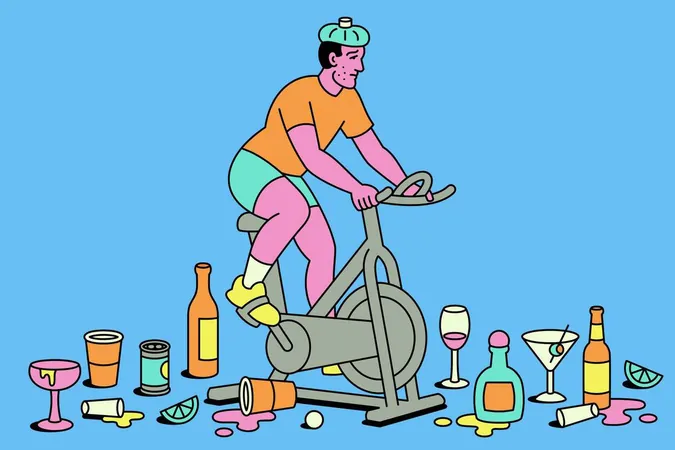
Feeling Crummy? Could Exercise Be the Surprising Cure for Your Hangover?
2024-12-24
Author: John Tan
How Hangovers Impact Your Body
After a night of indulging in alcoholic drinks, your body goes through a lot. Dr. Shaan Khurshid, a cardiologist at Massachusetts General Hospital, notes that you could be experiencing dehydration, digestive disruptions, sleep disturbances, and heightened anxiety. The body's response to alcohol, a relaxant that temporarily soothes stress, can lead to an adrenaline crash the next day, leaving you jittery or on edge.
For many, the subsequent day’s workout can feel extra challenging due to an already elevated heart rate from the hangover. For those with heart arrhythmias, avoiding intense workouts is prudent, as the cardiovascular system may be stressed.
Moreover, alcohol acts as a diuretic, increasing urination and leading to a higher risk of dehydration. This, combined with the likelihood of unhealthy eating while drinking, can leave you poorly fueled for any physical activity.
Choosing the Right Type of Exercise
Despite the lack of extensive research on the correlation between exercise and hangover relief, experts agree that rehydration is crucial before any workout. Dr. Khurshid suggests munching on some salty snacks and hydrating generously with water beforehand.
If you're considering exercising, choose low-intensity workouts over high-demand activities that require coordination and concentration—think light jogging, brisk walking, or gentle cycling. Engaging in these less taxing activities can still offer benefits without risking injury.
As always, listen to your body. If exercising begins to feel good, and you're gradually feeling better, you can increase the intensity. However, if things take a turn for the worse, it's wise to cut your workout short.
Exercise as a Mood Booster
While a hungover workout might not be a magical solution, individuals who regularly maintain a fitness routine are more likely to experience benefits from light exercise compared to those who rarely engage in physical activity. The endorphins released during exercise may also enhance your mood, providing a much-needed lift after a long night.
Remember, there’s no harm in taking it easy. If during your workout you still feel awful, it’s perfectly acceptable to stop and try again another day. After all, there are plenty of hangover remedies out there — exercise should be one of the more enjoyable options.
In the quest to find a remedy for hangovers, exercise might just prove to be an unlikely hero – as long as you approach it sensibly and listen to your body’s needs. Who knew a workout could potentially aid in recovery after a night of indulgence?


 Brasil (PT)
Brasil (PT)
 Canada (EN)
Canada (EN)
 Chile (ES)
Chile (ES)
 España (ES)
España (ES)
 France (FR)
France (FR)
 Hong Kong (EN)
Hong Kong (EN)
 Italia (IT)
Italia (IT)
 日本 (JA)
日本 (JA)
 Magyarország (HU)
Magyarország (HU)
 Norge (NO)
Norge (NO)
 Polska (PL)
Polska (PL)
 Schweiz (DE)
Schweiz (DE)
 Singapore (EN)
Singapore (EN)
 Sverige (SV)
Sverige (SV)
 Suomi (FI)
Suomi (FI)
 Türkiye (TR)
Türkiye (TR)